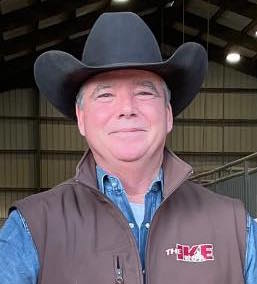 Total Earnings: $2,238,026
Total Earnings: $2,238,026
As an NCHA AAAA judge, one of Brett Davis’s favorite things about judging is the finals. Everyone’s goal is to make the finals and hopefully win. As a judge, it is exciting to see what everyone brings to the table when they lay it all on the line to win a coveted buckle. He was of the five judges in the 2019 Futurity that Gary Bellenfant won.
Davis was introduced to cutting horses after attending the 1980 Futurity Finals with his mom. Davis was curious about cutting so his step father introduced him to trainer Paul Carter. He went to work for him and then he went to work for trainer Pat Earnhart.
2021 was Davis’s 40th Futurity attendance; he started training cutting horses in 1981.
Davis was inspired to get his judges card to help his clients and the sport as a whole.
“I think all professional trainers should have their judges card so they can explain things to their clients… I started judging years ago to give back to the industry. I got my card in the 80s. And then I took a break from it in the 90s. I don’t judge a lot.”
“I want to do a good job and I want to do it right.”
He has judged two Futurities and said he really enjoys it because you have never seen the horses before and have no preconceived notions about them. Davis has now hung the bridles up and turned his place over to his son, Bradey Davis, who is also a cutting horse trainer. Davis mainly focuses on his cattle operation.
What are you looking for as a judge?
“I want to watch a horse that’s good at what it does and that they can stay even without mistakes. I like when a rider takes a chance, exposes himself, maybe staying on a cow longer than he should have or cuts a tougher cow to try to mark a little more…
“I categorize the horses today. You have the mechanical horses and the cow horse. The mechanical horses will make it through the go rounds…But when it gets to the finals nearly every time the cow horse wins. It’s fun to watch a really good horse takeover.”
What are your personal preferences?
“I like to see one stop. I like to see a big stop. I like a cow horse with their ears up focusing on their job.”
What is it about the stop that you like?
“I think if it’s done properly that horse has learned that he has to stop with that cow and so when a guy is showing one and he asks him out past the cow, that’s when you get that big stop.”
How do you manage the big aged event numbers?
“At the aged events I remember my first 72. Don’t let that turn into a 73 by the end of that 5th day. I try to remember what kind of run that [72] was. Because I don’t want to take anything away but I don’t want to give any [points] away. If I see a good run I don’t mind giving them a 74 or 75. I don’t think there is enough of that done. When you see something you like, put a big number on it…”
Davis said if he likes the run he will score it. He rewards people for taking a chance.
“In the go rounds, I don’t have a 73 ½ on my card. If I like it, I give it a 74. I use my ½ point in the finals. That’s just me and my thought process.”
He added that “positive spots are easy to give if you’re looking for them.”
How does judging influence the way you communicate with your clients before they show?
“What I would always preach is that the judges aren’t sitting up there trying to find a way to take you out of the cutting so don’t take yourself out. Do your job, cut clean and try to stay even with the cow. And leave the judging to the judge and let him make the run…
“On the flip side of that with me, judging always helped me show because [when judging] I would see the mistakes people made and you try to clean [up your own showmanship] and it makes you a better showman. As a judge who’s judged everything, I could be having a run and I have a mistake and I think I should pull up because I’m out of it anyway. You should never think that way, you should keep showing no matter what.”
What would you say to the person that grumbles about their score?
“First thing I ask them is ‘do you judge?’ and then the other thing is maybe you should go watch it and see what you think. I have been a grumbler too, but I had someone say well you did this and you did that. Sometimes you forget about that stuff. Any competitor is going to grumble if they aren’t winning.”